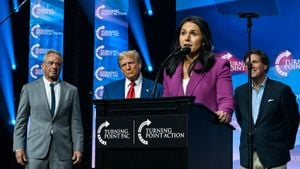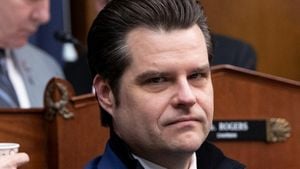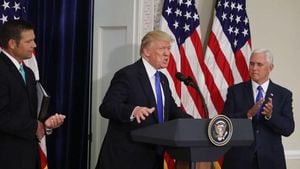Nick Bosa, the standout defensive end for the San Francisco 49ers, has recently stirred up some political controversy, earning himself an $11,255 fine from the NFL after wearing a "Make America Great Again" (MAGA) hat during a postgame interview. This incident, which happened after the 49ers' thrilling 30-24 victory against the Dallas Cowboys, has reignited discussions about the league's strict policies on political messaging.
The postgame moment unfolded on October 24 when Bosa interrupted reporter Melissa Stark's interview with teammates Brock Purdy and George Kittle by pointing to his white MAGA hat. His spontaneous display was met with swift scrutiny since it violated the NFL's rule banning players from wearing or displaying any personal or political messages during games and interviews. A source familiar with the matter explained the league's stance, noting the fine was for breaching the policy against political messaging, which could also apply to other non-football-related activities.
Following the incident, Bosa, known for his vocal support of Donald Trump, expressed he anticipated the fine but deemed the act "well worth it." He stated, "Clearly, the nation spoke," reflecting on Trump's victory just days prior to the fine. This highlights Bosa's alignment with the former president's political sentiments, having been one of Trump's notable advocates among professional athletes.
The NFL has maintained its policy for years, stating players aren’t allowed to convey personal messages related to political activities. This policy is legally framed within the league's rulebook and aims to keep sports and politics separate. According to Rule 5, Section 4, Article 8, the NFL reserves the right to not allow any team or player to wear messages on their gear relating to political activities or causes, non-football events, or unapproved charitable campaigns.
Interestingly, Bosa's fine came after the completion of the recent presidential election, where Donald Trump won against Kamala Harris, allowing the NFL to avoid potential backlash leading up to the election. By delaying the announcement of the fine until afterward, the league sidestepped any extra controversy, which seemed calculated. The decision was strategic for the NFL, as the league has previously been at the epicenter of political discussions, especially surrounding the protests related to the national anthem.
The league’s caution is not surprising considering its history with political matters. Back during Trump's presidency, his criticisms against the NFL, particularly concerning players kneeling during the national anthem, created significant division. Former Vice President Mike Pence famously walked out of an Indianapolis Colts game after players knelt, signaling the heightened tensions between the league and political views. The NFL is evidently eager to avoid reigniting these heated discussions, regardless of player politics, irrespective of party affiliation.
Bosa is not alone when it involves political statements from NFL players. The league's rules apply uniformly to everyone, targeting not only players who support Trump but also those with other political affiliations. Nevertheless, Bosa’s actions have prompted discussions among fans and commentators about the appropriateness of athletes making political statements, especially during designated sports times.
Despite the fine, Bosa's on-field performance remains stellar. Recently, he has accumulated 4.5 sacks, 28 tackles, seven of which were for loss, and one interception this season alone. His football prowess coupled with his political engagement paints a complex picture of modern athletes as they navigate their careers alongside their beliefs.
While some fans applaud Bosa's free speech, others argue it distracts from the game. The NFL's enforcement of its no-message rule is meant to keep political symbols out of its arenas, allowing fans to escape the heat of political discourse during games. Yet, the question lingers: Can players like Bosa, who have strong political beliefs, express themselves without facing backlash? NFL players often find themselves balancing their identities as public figures with the league's regulations, all under the spotlight of social media and public opinion.
So, what does this mean for Bosa and his teammates? Despite the fine, it appears he remains steadfast. History suggests such fines are often regarded as mere slaps on the wrist for players of his caliber, especially for someone who has signed lucrative deals like his five-year contract extension worth $170 million. With the political climate always shifting, Bosa’s actions could embolden more players to take political stands, but the NFL’s memo to teams is clear: players must think carefully about how their political expressions not only affect their careers but also the business aspect of the league.
This moment reiterates the longstanding debate: Should sports remain politically neutral? The NFL has made its stance clear, and players like Bosa are now faced with the challenge of asserting their political beliefs within those bounds, all the time knowing there are financial repercussions for crossing lines drawn by the league. The intersection of sports and politics is as compelling as it is complex, making this incident just one of many potential flashpoints of discussion for fans and analysts alike.



